It’s like something out of a science fiction story, but it’s cold, brutal truth. The Heaven’s Gate cult came to an abrupt, quiet stop in late March of 1997 with a uniformed, well-documented mass suicide. However, over the course of the past 20 years, the 39 lives lost on that day drifted from public consciousness. Sure, there was a brief yet incredibly thorough synopsis of the cult’s final years in “Drink The Kool-Aid,” the ninth episode of American Horror Story: Cult. But beyond that, not much has sprung up on the subject since the dawn of the twenty-first century. Why did they do it? Who were the people that fell victim to the ideology of their cult’s leaders—the 39 human beings with families and friends that bought into all that bullsh*t right to the very end? Surely they must have been insane, right? Must have had something wrong with them before joining up? I went looking for answers to these questions within the HBO Max original docuseries Heaven’s Gate: The Cult of Cults, and the truth wasn’t what I expected.
Thinking Back on the “Away Team”

At age 32, I had but the foggiest of memories of the Heaven’s Gate cult and what happened to them. I was 9 years old when Marshall Applewhite, known to his followers as Do (pronounced “doe”), ordered his people to dress in their “Away Team” uniforms, eat their apple sauce/pudding/barbiturate concoction, and lace up their black Nike Decades. I remember seeing the footage from the crime scene. Maybe it was on the evening news? Maybe it was a 20/20-style special? That part I’m not sure on. But little me knew that someone had persuaded those people to take their own lives, believing they’d be carted off in a UFO behind the Hale-Bopp Comet. That baffled me.
Once I clicked play on the first episode of Heaven’s Gate: The Cult of Cults, I wasn’t baffled for long.
Within seconds of the initial episode’s opening scene, your skin begins a lengthy crawl. You are debased on the spot. Before there’s any humanization of the cult members, you get an unsettling look at the very end of their journey: the gobsmacking final form of the beast that was Heaven’s Gate. The home video footage used at the very beginning, which was made by the cult members themselves, feels alien, sterile, but imbued with a grotesque sense of warmth. You can tell that these people, the members, are incredibly happy with where they are at in their timeline (which, of course, you quickly realize is their very end). Their smiles and their chipper spirits are upsetting, to say the least, seeing as within a few short days they’d slip those matching sneakers on and shed their earthly “Vehicles.”

As a viewer, this pre-title sequence gave me the sense of sudden immersion into a world I didn’t understand or like being in. There’s the open use of their taken names, all of which end in “ODY.” “What?” I was left thinking. “Why are they all called things that rhyme?” It feels like opening Anthony Burgess’s A Clockwork Orange towards the end and trying to read a full page of Nadsat without a damn clue what anything means. You think your ears are listening wrong, that these words you’ve just heard are somehow maybe misheard, but no: those are the names they’ve taken—or maybe it would be better to say that they are the names they’ve been given.
Beyond the cringe-inducing opening, I warmed to two of the former Heaven’s Gate members that we’re introduced to: Frank Lyford and a man simply referred to as Sawyer. Over the course of the four episodes, these two take such utterly divergent paths, coming to rest at antithetical points of view on the entire subject of Heaven’s Gate. But before all that, they’re the same; they’re just two men who’d been indoctrinated at a young, critical age.
Before I go any further in my thoughts on this series, I’d like to say that what follows is not a blanket condemnation of any religious group or belief system. On the contrary, if anything I think that Cult of Cults made me understand a little more about the blind faith certain people seem to garner so easily and how people fall into whatever beliefs they hold dear. This is simply a brief and abridged glance into pieces of my past, moments lived from my perspective, things that are relative to the subject matter.
Dots Connecting
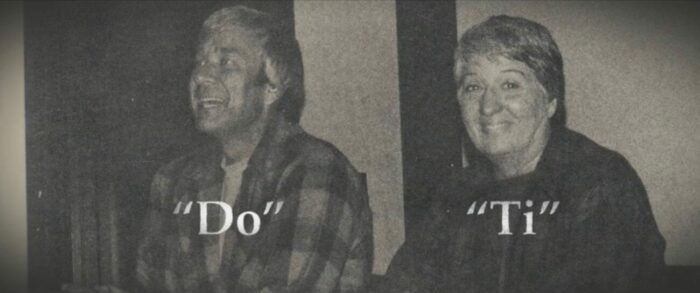
During the runtime of the first episode, the entire process is laid out regarding how Ti and Do (Bonnie Nettles and Marshall Applewhite, respectively) collected followers throughout the 1970s. After establishing their fundamental beliefs (though some tenets stayed in flux and evolution for many years), the group meetings the two put on instantly set off alarms in my head—screeching sirens of which I couldn’t find the origin at first. I knew I was unsettled, not as much as at the beginning, but something felt familiar to me about their methods, their means of persuasion.
I spent my early teenage years involved with a church that is widely considered to be mainstream in America. We’ll just say non-denominational Evangelical. Some descriptions of the way in which Ti and Do broke down the individuals they accumulated, harvested if you please, reminded me of certain “youth activities” I partook in back in the early 2000s. At their meetings, it has been said that (particularly early on) attendees would experience a shared euphoric sensation. Feel things. Even, at times, see things.

A little while into this description, I began to have memories bubble up of a youth convention I went to called “Acquire The Fire.” If memory serves, it was something of a traveling show (as Ti and Do’s were, too), traveling the country from city to city, doing their thing. The Acquire The Fire convention most crisp in my mind (the one I went to) took place in Baltimore in a giant arena packed thick with teens and Youth Pastors, Youth Leaders, and various other adults. Chaperone-types.
Over the course of a weekend, kids went in there—just typical teens living in a freshly post-9/11 world—and came out True Believers. I saw it all around me: kids that I knew didn’t give a wet fart about God or Jesus, or really anything for that matter. Before my very eyes, there they were crying and shouting, claiming themselves as “saved,” rejecting the evils of this world. Devotees on the spot. I wasn’t entirely unconvinced prior to being exposed to ATF’s extensive sermons, engaging testimonials, mass-prayer sessions, and even—yes, I’m serious—Christian goth-industrial bands (early Skillet, anyone?) But heaven help me, I was counted amongst the faithful on the way out the door.

The moment that memory, distantly buried beneath the sands of my time, cropped up, I got it. The whole thing clicked a little more.
I understood Sawyer then (SWYODY, his given name). I saw how easily someone with nowhere to go, nothing to do, no real sense of self, could be transformed. I understood because I had experienced that myself. Sure, I wasn’t in a UFO-based cult that ended in a heartbreakingly tragic way. That’s not at all what I’m saying. I became a follower of a certain set of ideals, a particularly invasive brand of a common faith, over the course of a weekend, along with a hell of a lot of other impressionable kids my age. A total about-face in lifestyle isn’t so far outside of the box of possibility. Neither my possibilities box nor yours, frankly. I’ll get back to that.
“The Price You Pay”
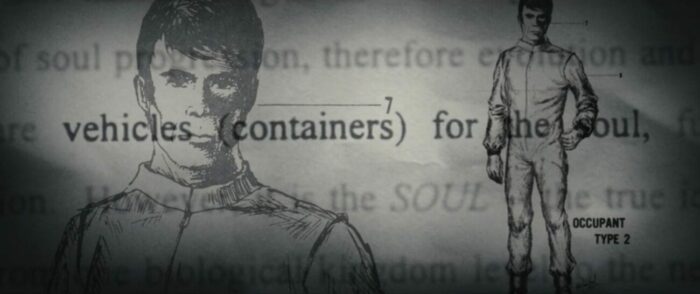
Little by little, the four-part series pries back the exterior membrane and lets you see glimpses of what the inner workings of Heaven’s Gate looked like, sounded like, and felt like. Ti and Do established, among other things, alternative ways of referring to things. Heaven was referred to as the “Next Level” amongst the group. Your body, as previously mentioned, was a “Vehicle”: nothing but a flesh suit, coddling your elevated and burgeoning self for the “Next Level” within it. A butterfly’s cocoon.
But there was more to it, too, and this is where things got interesting for me. In an attempt to drive a wedge between the converted and the outside world, houses were known as “Crafts.” Rooms became “Labs.” There was the “Nutri-Lab” (kitchen), the “Fiber Lab” (laundry room), the “Compu-Lab” (office). Heading for a nap? You’d catch your 40 winks in the “Rest Chamber.” There were harmless, almost non-sensical names. Money was known as “Sticks.” Recipe for sourdough? That’s a sourdough “Formula.”
You get the point. But the rubber really meets the proverbial road in a few altered phrases and gives an insight into the type of control we’re talking about here. The mind was referred to as the “Computer.” In today’s times, computers can do practically anything they want besides reproduce or grow food. We’re used to relying on computers and AI (which… don’t get me started) for a great many things. But back in the times when Ti and Do were still Bonnie Nettles and Marshall Applewhite, computers were programmed with certain things and remained that way. The user put info and data into the computer far more than they took from it. There wasn’t a Siri at the ready to tell you things on demand. You had to put in, say, a floppy disk on geography to find out what countries share boundaries with Uzbekistan. Equating the human mind, capable of and prone to free-form thought, with a computer implies things to us on the outside that perhaps didn’t raise eyebrows to those on the inside.
The Heaven’s Gate crowd were programmable. The software was the sermons, the gospel, the mindset, the lifestyle—any damn thing Ti or (more so) Do thought to download into them.
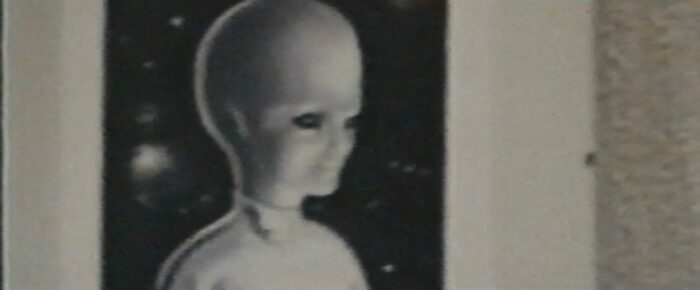
I mentioned two former members earlier on, Frank and Swayer: the ones that got away (along with countless others who didn’t participate in the series). Sawyer’s ejection from the cult came from his inability to remain “pure of thought.” His weakness? MTV. Madonna music videos. These, according to the man himself, led him to habitual masturbation—a big fat no-no with Do and company. This might be a shocker, but the whole “self-love” thing wasn’t exactly smiled upon kindly in my little church either. Routinely, the subject would be brought up at Youth Group, leading to feelings of guilt and anxiety over something practically no teen on earth doesn’t dabble in. Dabble I did. Dabble Sawyer did. Maybe he dabbled a bit more than me, but we both felt a sinking remorse for doing so. Ultimately, Sawyer’s habit of yanking his crank saved his life. Lucky for him! The others he left behind, however—sexless, many even agreeing to castration—had been convinced that their rigid, chaste lives were made whole through their exit. Sex in thought or deed of any kind wasn’t worth ruining their shot at the “Next Level.”
As Springsteen once sang, “Now you can’t walk away from the price you pay.” The same man also said that “Everybody has a hungry heart,” but something tells me Do and company weren’t fans of such a sentiment.
Final Frontier

One thing they were fans of caught me a little off guard: Star Trek: The Next Generation. Every week, members would gather around and take in the newest episode together. Heaven’s Gate: The Cult of Cults does a good job of quickly summing up their fandom for the show. Members of Heaven’s Gate weren’t subtle about it, either. There was no shoe-crossing, hand-wringing, or bashfulness regarding their affinity for the adventures of the USS Enterprise (NCC-1701-D) and its crew. No greater evidence of this can be found outside of member Denise J. Thurman (JWNODY)’s sign off in the cult’s exit video:
And one last thing we’d like to say is… 39 to beam up. Thank you.
There are carefree giggles when she says this, complete in the middle of the phrase with the activating of a make-believe Star Fleet badge communicator. As a fan of Gene Roddenberry’s massive televised and cinematic universe, I recognized this phrase right away. Hell, even calling themselves the “Away Team,” as if they were down here with Galileo waiting to return them after a mission, screamed to me as a fan.
But here’s where the importance of perspective is crucial. The members of Heaven’s Gate were enamored with the insidious, damn-near fascist intergalactic race, the Borg. As a kid watching TNG, the Borg gave me both the heebies and the jeebies in equal measure. Their methods of assimilation, their merciless pursuit of claiming beings and craft alike for their own purposes ran cold fingers along my back and put a little knot in my then-tiny stomach. How could these people root for them? Admire them? Find any commonality in a phrase like “Resistance is futile”?
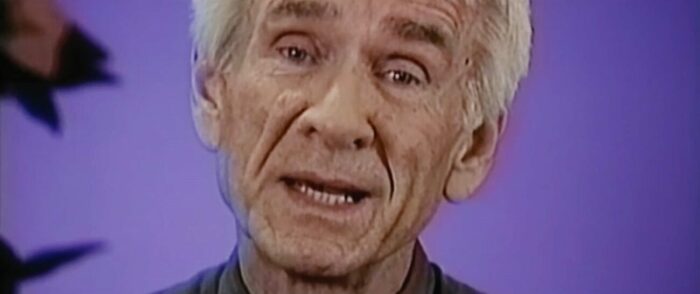
Easy. They essentially were the Borg, claimed and controlled by Do (and Ti before her death in 1985). Assimilated. Reprogrammed. It’s easier to empathize with empty vessels, completing tasks for the betterment of the Hive, when that’s the life you know.
As mentioned, the departure of Ti (Bonnie Nettles) roughly halfway through the cult’s 22-year existence seemingly only served to strengthen things. There was a bona fide deity now who’d ascended to a place of prominence in the “Next Level”—a star in the sky to wish on, to watch over them all while they eagerly toiled towards their perceived perfected states. That’s not unlike the Borg, either. The desire to serve the queen, to perfect and gather and assimilate bodies to her will, certainly can be seen as an allegory to their mission.
The Sum of All (Rational) Fears
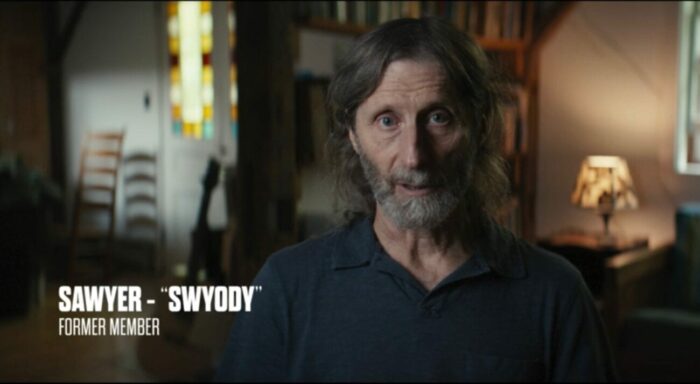
I sat down to watch the docuseries on the second day of 2021. I was excited. I’d been looking forward to getting HBO Max, one big reason being this series. My excitement paid off. I was fascinated by the subject matter, taken on a riveting ride through the history and horrors of Heaven’s Gate.
The final analysis, the difference between Sawyer and poor Frank Lyford (a man still struggling to live life post-cult) was stark. I felt for Frank. He lives in a world now that he once knew, one that he’d, in many ways, left for a considerable while. The cult took the love of his life with it in 1997.
Oddly, I too know a little bit about having someone you loved turn from you in favor of a belief system. Without going into too many details, let’s just say that as an adult I rejoined the church of my youth (which I had left before turning 16) for love. I was nuts over someone who was/is a fervent believer. I came back into the fold, as they say, only to be left (divorced, actually) out of the blue because “God said to.” Yeah. Primo Funsville.
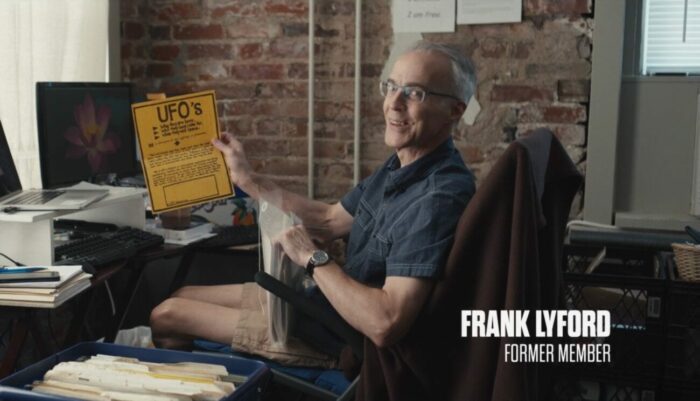
I’ve more than moved on since, from that person and that damned church, for which I consider myself lucky. But seeing Frank, someone who left Heaven’s Gate and wasn’t followed by his love, was hard. He stepped away, tried to get her to join him, but she rode that train all the way to the final stop on the line. In contrast, the exiled Sawyer still believes, generally speaking. He is still imprinted with the sensibilities programmed in him long ago. That, too, was hard for me to witness as a viewer. The power of persuasion is so thick in his existence; he hasn’t managed after all this time to fully extract himself from it all. It’s not easy. Once you’re set a certain way, live out years on end seeing the world from a particular perspective, it’s incredibly hard to differentiate truth from fiction.
Two days after I finished watching Heaven’s Gate: The Cult of Cults, it was January 6th, 2021.
The power of persuasion can be used as a weapon to serve the needs of the persuader. Lies presented as truth have the ability to bear the most bitter of fruits, make monsters out of the ordinary, give phony omniscience to the deceitful.
Cults proliferate only with the insatiable power of belief. Be careful what you believe in. It’s not as hard as it may seem to become the converted.
AUTHOR’S NOTES: Some of this subject matter is quite heavy. Just a friendly reminder that help is always a phone call away and the National Suicide Prevention Lifeline: 800-273-8255.
Also, if either you or someone you know are struggling with active participation in a cult, please visit the websites linked here or here. No shame, no guilt, just recovery. Just you again.

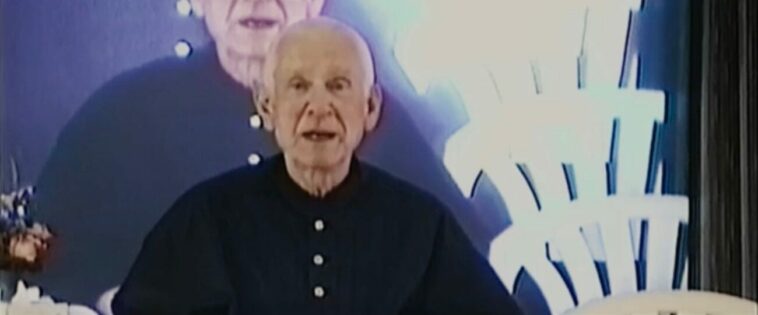
No one “persuaded those people to take their own lives, believing they’d be carted off in a UFO behind the Hale-Bopp comet” as the first sentence on their still up website states that “whether or not Hale-Bopp has a companion is irrelevant from our perspective”.
I’m watching Dark Side of the 90s which aired an episode comparing and contrasting the Branch Davidians and Heavens Gate. Looking up stuff as I watch led me to your excellent essay and I wanted to thank you for writing and posting it. I was 30 when this happened and I continue to be shocked at people who fall for nonsense. Your epilogue about 1/6 was the perfect summation.